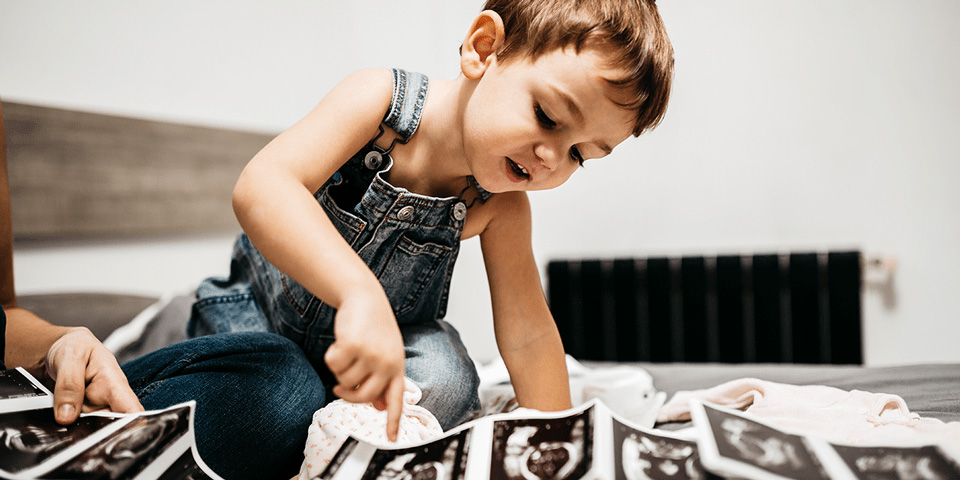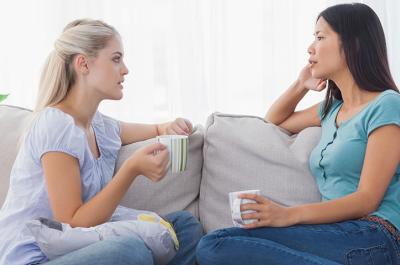How to tell your kids you’re pregnant : An age-by-age guide

If you’re adding a baby to your family, you may wonder: What’s the right way to share the news with your kids? You want them to be excited, but pregnancy can be a complicated concept for a young child, or uncomfortable for an older one. Is there a right or wrong way to tell them? After you tell your partner you’re pregnant, how long should you wait to share the news with your young ones?
No one knows your child like you do, but there are certain things you’ll want to consider when telling your child about their new sibling. They may be excited or have anxieties about what the new baby means for them (or both). How you tell them can help them feel much more comfortable about the future of your growing family.
When should you tell your kids about your pregnancy?
The first thing you’ll want to consider is when to tell your kids. Most experts recommend at least waiting until after the first trimester, when risk of miscarriage has declined.
Once your pregnancy is well-established, consider how soon you want other family members or people in your life to know. Young kids are not always the best at keeping secrets, so you’ll likely want to wait to tell them until you’re ready to tell others. If you do decide to share your pregnancy with family members or friends before you tell your kids, make sure to ask them to keep the news quiet until it’s time to let your kids in on the excitement.
Your child’s age will play a big factor in when and how you give them the new-baby news. A conversation about a new baby with a preschooler is going to look very different from a discussion about the same topic with a teenager. Regardless of your child’s age, the decision to add to your family is life-changing for all of you, so approach the announcement with consideration.
How to tell your toddler you’re pregnant (tips for ages 1-3)
It can be hard for a toddler to fully grasp what “a baby on the way” really means. Consider laying groundwork that introduces them to the concept of babies. Toddler-friendly ways to do this include:
- Giving your toddler a baby doll to get them acquainted with what it looks like to have a baby around.
- Talking to your child about animals and their babies — zoos, kids tv programs or even hands-on experience with pets are all great for this.
- Reading an age-appropriate book together about welcoming a new baby into the family.
Concrete visual aids will be a big help — which might be a reason to wait until you’re showing to tell your toddler. Since you’ve already been pregnant before, you may start to have big physical changes earlier than you did the first time around. This is when you can point to your belly and explain to them about the baby growing inside. Make sure to use simple, direct terms. Your baby should be kicking by this time as well, so invite your toddler to feel them!
How to tell your preschooler you’re pregnant (tips for ages 3-5)
Preschoolers are trying to figure out the world around them. They may be able to understand more than a toddler, but they’ll have lots of questions. “How do babies grow?” “How do they come out?” “How did the baby get there?” Your preschooler might ask any number of variations on these questions, so it may help to think about how you want to answer them in advance.
Some important considerations for telling a preschool-age kid you’re pregnant:
- Be age-appropriate and don’t go overboard with details. Stick to simple explanations like “There’s a baby growing in my uterus, which is a part of my body.”
- Books about a baby’s development and being a big sibling can help with explaining what to expect.
- Chances are, your preschooler has friends with little siblings, so you can reference this when announcing that they’ll be getting one.
- Children this age are learning to manage and regulate big feelings, so acknowledge and accept them as they come.
Remember that nine months can be an eternity for a child this young. The middle of the second trimester is a great time to tell a preschooler about your pregnancy so their wait doesn’t feel endless. Time can still be an abstract concept to your preschooler, so consider using a holiday or time of year as a landmark — tell them the baby will come around Halloween, or in the summer.
How to tell your school-aged child you’re pregnant (tips for ages 6-12)
Older children will most likely have a solid grasp on what it means to be getting a new sibling. This means they understand the positives of getting a new family member, but also may have concerns about things like having to share toys, space or attention. Because your older child is used to being top dog, they may be apprehensive of the new baby at first.
With school-age children, you can have a little more fun with how you announce the pregnancy. Focus on getting them excited for the new baby with these ideas for a pregnancy announcement for kids:
- Show them an ultrasound picture of their new sibling.
- Give them a letter or a gift from the baby.
- Create a scavenger hunt that ends in a surprise reveal.
- Try to frame the baby as a new best friend to be excited about — someone who they can play with and teach about things they like.
Most importantly, make sure they know that there’s enough of everything to go around for everyone — love, time, space or whatever else your child may be concerned about.
How to tell your teenager you’re pregnant (tips for ages 13-18)
There aren’t many limits to announcing your pregnancy to your teen. As with school-age children, you can get creative with fun pregnancy announcement ideas. Just be prepared for them to not be completely thrilled right away. It’s normal for teenagers to be more interested in their own lives, friends and activities than they might be in babies.
Although you might be tempted to lean on your teenager as an extra set of helping hands, you may not want to present the arrival of the new baby as something that will bring a lot of extra responsibility for them. It’s possible for your teen to resent their new sibling (and you) if the only thing they associate them with is more chores. Instead, allow your teen to come around to the idea of having a new baby in the family on their own time. Any disinterest they feel is likely to melt away when they’re holding an adorable baby in their arms!
Easing anxieties after a pregnancy announcement
Make sure you have had time to fully process your emotions about the pregnancy before telling your child. You may have many anxieties yourself, especially if the pregnancy is a surprise.
Whenever you make the pregnancy announcement to your child, set aside a calm time for them to process the news, and make space for any questions or concerns they may have. If they seem worried, acknowledge their feelings and ask what would make it better.
Involve them in helping with preparation for the new baby, but keep a good balance of baby talk and non-baby talk. They may need reassurance that their new sibling’s arrival will not change their relationship with you, so be sure to spend time with them that doesn’t revolve around the baby.
Remember: It’s completely normal for your child’s emotions to go back and forth. They may be ecstatic one day and become jealous or angry the next. It’s important to meet your child where they’re at. Acknowledge their feelings and address any concerns with care. With the right preparation, they’ll be as excited as you are to meet their new little sibling!




